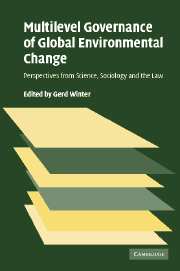 Multilevel Governance of Global Environmental Change
Multilevel Governance of Global Environmental Change Book contents
- Frontmatter
- PREFACE
- Contents
- List of figures
- List of tables
- Notes on contributors
- List of abbreviations
- 1 Introduction
- PART I Earth system analysis
- PART II Society and institutions of global; environmental change
- PART III Self-regulation of industry and the law
- 6 Private authority, global governance, and the law
- 7 Responsibility of transnational corporations in international environmental law: three perspectives
- 8 Transboundary corporate responsibility in environmental matters: fragments and foundations for a future framework
- PART IV The potential of the state
- PART V The potential of world regions
- PART VI Formation and implementation of international regimes
- PART VII Improving the instruments of global governance
- PART VIII Fundamental concepts of institutionalising common concern
- Index
6 - Private authority, global governance, and the law
The case of environmental self-regulation in multinational enterprises
Published online by Cambridge University Press: 04 May 2010
- Frontmatter
- PREFACE
- Contents
- List of figures
- List of tables
- Notes on contributors
- List of abbreviations
- 1 Introduction
- PART I Earth system analysis
- PART II Society and institutions of global; environmental change
- PART III Self-regulation of industry and the law
- 6 Private authority, global governance, and the law
- 7 Responsibility of transnational corporations in international environmental law: three perspectives
- 8 Transboundary corporate responsibility in environmental matters: fragments and foundations for a future framework
- PART IV The potential of the state
- PART V The potential of world regions
- PART VI Formation and implementation of international regimes
- PART VII Improving the instruments of global governance
- PART VIII Fundamental concepts of institutionalising common concern
- Index
Summary
Environmental protection in multinational enterprises: a dilemma of globalisation
The discussion about corporate governance in multinational enterprises refers to a social problematic of ground-breaking historical significance, which characterises the contemporary stage of globalisation in general. This problematic consists in the tension of parallel processes of ever-increasing economic interweaving and a dynamic of legal, cultural, and technological homogenisation on the one hand, as well as a series of countervailing developments, disintegrative tendencies, and increasingly porous legal and political structures on the other. As far as the multinationals are concerned, they are perceived by the Third World as an indispensable agent of modernisation, as promoters of global economic integration, and as representatives of the modern technological universe, yet at the same time economic expansion can lead to the result that developing countries are played off against each other, that their steering capacity will be ever more limited, and that existing regulatory gaps and low standards will be used by enterprises to externalise costs and negative outcomes to a great extent. The legal construction of the independently managed subsidiary can be strategically employed to hide behind the sovereignty of the host state and to immunise the parent enterprise against possible legal risks and consequences of damages.
In the absence of a ‘world state’, ‘world government’, or international institutions empowered to define and realise binding minimum standards directly addressed to non-state actors, the question arises whether the existing need of governance can be satisfied, at least in part, through reflexive governance mechanisms, patterns of ‘regulated self-regulation’ on the global level, and new ways of connecting the corporate world and the state-centric world: briefly, through manifestations of what is currently discussed under the catchword ‘global governance’.
- Type
- Chapter
- Information
- Multilevel Governance of Global Environmental ChangePerspectives from Science, Sociology and the Law, pp. 149 - 178Publisher: Cambridge University PressPrint publication year: 2006
- 2
- Cited by


